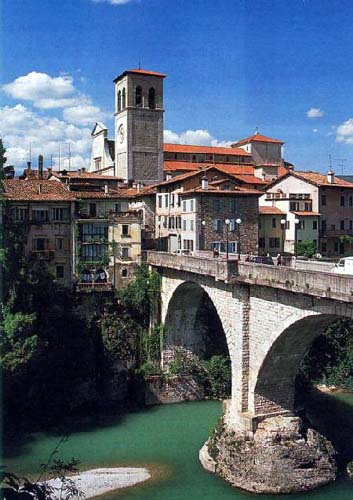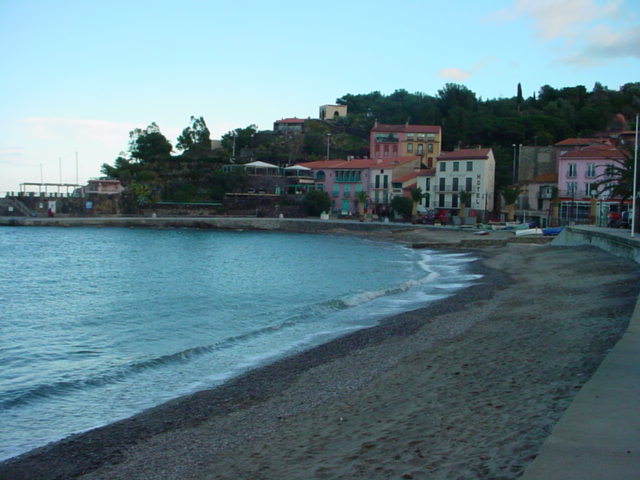 The vacation Pawel and I took in the summer of 2005 was mostly about getting away from tourists. When we encountered too many Dutch campers on the shores of Lago di Garda, we fled northwards, to Belluno. I mostly wanted to go to Belluno because it was the setting for a book I had read earlier in the vacation by Donna Leon, A Noble Radiance. The town of Belluno sits high above the road, and there is an elevator to get from a big parking lot up to the town. The area surrounding the town has lots of steep mountains, hills, and ravines. After suffering bouts of fear of heights on the craggy mountain tops in the heart of the Dolomiti, we drove eastwards, towards Slovenia. On our way there, we stopped in Udine (Pawel was hungry, pizza was procured), and it was a pleasant town with few tourists. Further along the road, we made an extended pit stop in Cividale del Friuli, a town reaching back to Roman times. Along with the nearby Aquileia (site of a Roman city, and unforgettable mosaics from the 4th century), it played an important part in Italian history in the Middle Ages. This town was one of our favorites; we felt like we were discovering it for ourselves - once in a while we'd see a furtive tourist with guidebook in hand, but it was rare. We liked that.
The vacation Pawel and I took in the summer of 2005 was mostly about getting away from tourists. When we encountered too many Dutch campers on the shores of Lago di Garda, we fled northwards, to Belluno. I mostly wanted to go to Belluno because it was the setting for a book I had read earlier in the vacation by Donna Leon, A Noble Radiance. The town of Belluno sits high above the road, and there is an elevator to get from a big parking lot up to the town. The area surrounding the town has lots of steep mountains, hills, and ravines. After suffering bouts of fear of heights on the craggy mountain tops in the heart of the Dolomiti, we drove eastwards, towards Slovenia. On our way there, we stopped in Udine (Pawel was hungry, pizza was procured), and it was a pleasant town with few tourists. Further along the road, we made an extended pit stop in Cividale del Friuli, a town reaching back to Roman times. Along with the nearby Aquileia (site of a Roman city, and unforgettable mosaics from the 4th century), it played an important part in Italian history in the Middle Ages. This town was one of our favorites; we felt like we were discovering it for ourselves - once in a while we'd see a furtive tourist with guidebook in hand, but it was rare. We liked that.The see of Aquileia was founded by St. Mark, who had been sent by St. Peter to go to Alexandria. From 535 to 536, the Bishop of Aquileia along with some others broke off from the Pope in Rome. After Italy was overrun by Lombards, and many of the smaller entities that had been subservient to Aquileia (whose leaders had now fled to Grado, an island off the coast of Trieste) adhered to the Pope, the Lombards set up a new patriarchate at Aquileia; so there were now two Aquileian patriarchs. The Popes went on to recognize those in Grado (rather than those actually in Aquileia). The city flourished in the years around 1000, but by the 14th century an earthquake and other problems left it deserted.











